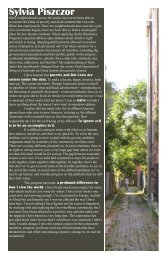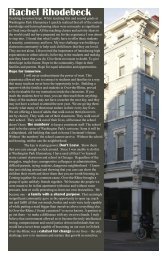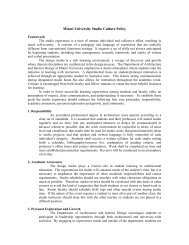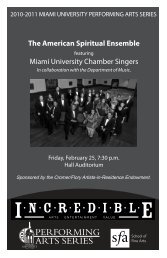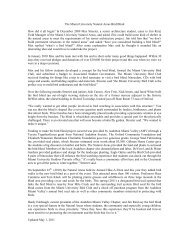Program Guide - Miami University School of Fine Arts
Program Guide - Miami University School of Fine Arts
Program Guide - Miami University School of Fine Arts
You also want an ePaper? Increase the reach of your titles
YUMPU automatically turns print PDFs into web optimized ePapers that Google loves.
MIAMI UNIVERSITY DEPARTMENT OF THEATRE presents<br />
1<br />
Hair<br />
Book and Lyrics by Gerome Ragni & James Rado<br />
Music by Galt MacDermot<br />
Directed by Bekka Eaton<br />
Jack Liles, Musical Director<br />
Tamara L. Honesty, Scenic Designer<br />
Lin Conaway, Costume Designer<br />
assisted by Trisha H<strong>of</strong>fman<br />
Jay Rozema, Lighting & Sound Designer<br />
Jessica Basista & Robert Deason, Make-up Designers<br />
Stacy Gear-Schindel, Choreographer<br />
Steven R. Pauna, Technical Director<br />
Kathleen Petroziello, Stage Manager<br />
Produced by special arrangement with, and the music and dialogue<br />
material furnished by TAMS-WITMARK MUSIC LIBRARY, INC., 560<br />
Lexington Avenue, New York, NY 10022
2<br />
(What’s So Funny ‘Bout)Peace, Love<br />
And Understanding Lyrics<br />
written by Nick Lowe<br />
As I walk through<br />
This wicked world<br />
Searchin’ for light in the darkness <strong>of</strong><br />
insanity.<br />
I ask myself<br />
Is all hope lost?<br />
Is there only pain and hatred, and misery?<br />
And each time I feel like this inside,<br />
There’s one thing I wanna know:<br />
What’s so funny ‘bout peace love &<br />
understanding? Ohhhh<br />
What’s so funny ‘bout peace love &<br />
understanding?<br />
And as I walked on<br />
Through troubled times<br />
My spirit gets so downhearted sometimes<br />
So where are the strong<br />
And who are the trusted?<br />
And where is the harmony?<br />
Sweet harmony.<br />
‘Cause each time I feel it slippin’ away, just<br />
makes me wanna cry.<br />
What’s so funny ‘bout peace love &<br />
understanding? Ohhhh<br />
What’s so funny ‘bout peace love &<br />
understanding?<br />
So where are the strong?<br />
And who are the trusted?<br />
And where is the harmony?<br />
Sweet harmony.<br />
‘Cause each time I feel it slippin’ away,<br />
just makes me wanna cry.<br />
What’s so funny ‘bout peace love &<br />
understanding? Ohhhh<br />
What’s so funny ‘bout peace love &<br />
understanding? Ohhhh<br />
What’s so funny ‘bout peace love &<br />
understanding?<br />
A SPECIAL THANKS to<br />
Ann Elizabeth Armstrong for overseeing the content and organization <strong>of</strong> the<br />
dramaturgy for this <strong>Program</strong> <strong>Guide</strong><br />
Performance <strong>Guide</strong> Editor<br />
Lisa A. Campbell<br />
Dramaturgy<br />
Amy Foster<br />
Dr. Jeffrey Kimball<br />
Jene Shaw<br />
THEATRE ETIQUETTE<br />
• Please turn <strong>of</strong>f all cell phones and pagers.<br />
• The taking <strong>of</strong> photographs or use <strong>of</strong> recording devices is strictly prohibited.<br />
• If you have candy to unwrap, kindly do so now.<br />
• Please note the closest exit in case <strong>of</strong> an emergency.<br />
• Smoking is not permitted in the Center for Performing <strong>Arts</strong>.<br />
• Please discard all food and drinks before entering the theatre.<br />
• As a courtesy to the audience and performers, all latecomers will not be seated<br />
until an appropriate break in the performance.<br />
SPECIAL EVENT<br />
Please join us for an Opening Night reception, immediately following the<br />
show on November 18, in the Gates-Abegglen Theatre Lobby.
3<br />
Performance <strong>Guide</strong> CONTENTS<br />
Director’s Notes 4<br />
The Vietnam War 5<br />
Suggested Readings 7<br />
Synopsis/Musical Numbers 8<br />
Who’s Who in the Company 9<br />
Beware <strong>of</strong> Rules: A Look at the 60’s 13<br />
Designers Notes 15<br />
Company Credits 16
4<br />
DIRECTOR’S NOTES<br />
Youth has its own system <strong>of</strong> sifting through the noise <strong>of</strong> life to reveal some neglected truths. Youth will rise<br />
to find itself and express that unique self…and this is the enduring strength <strong>of</strong> Hair. Throughout the history<br />
<strong>of</strong> mankind, it has taken an immense amount <strong>of</strong> courage to point out the inconsistencies and hypocrisies <strong>of</strong><br />
each age—and courageous young people so <strong>of</strong>ten are on the front lines <strong>of</strong> that call-to-courage, both figuratively<br />
and literally. Upon receiving the assignment <strong>of</strong> directing Hair, I wondered how I might be able to impart these<br />
notions <strong>of</strong> truth and courage to a cast <strong>of</strong> college kids assembled in 2004. I feel a bit embarrassed about my<br />
concerns as I write this today.<br />
I am both astonished and humbled at the passion and care with which this cast has approached this play. They<br />
have managed to take on the causes and concerns <strong>of</strong> the late sixties with compassion and a deep desire to “get<br />
it right.” Further, they have made their own connections between the very specific issues <strong>of</strong> the late sixties and<br />
those in their own lives; Vietnam and Iraq, relationships with parents—when world-views collide, consumerism,<br />
stereotyping, censorship, sex pre-AIDS and post-AIDS, race relations—both hidden and overtly ugly prejudices,<br />
the power and toxicity <strong>of</strong> language, the status <strong>of</strong> women at home and in society at large, leadership and being<br />
lead, and the funky little big issue – freedom: what is it really, and what does it cost? We have posited the idea<br />
throughout our rehearsal process that maybe—just maybe—what could fix a lot <strong>of</strong> these and other ill’s <strong>of</strong> society is<br />
a whole lot more peace, love and understanding.<br />
Why are these three concepts so <strong>of</strong>ten dismissed as nice, but ultimately ineffective and unrealistic remedies?<br />
Does it seem too simple? What is simple about loving one’s enemies? About giving up blood-won territory to<br />
accomplish peace? About striving to understand the motivations <strong>of</strong> someone whose actions seem abhorrent to<br />
us? Yet are our customary alternative measures working? It takes a massive amount <strong>of</strong> courage and will to live<br />
by a credo embracing peace, love and understanding.<br />
John Lennon said, “War is over if you want it.” It’s just that simple. Children and young people know this<br />
intuitively. Thank God for them. Maybe our younger generation can fix some <strong>of</strong> the mess we’ve left them with.<br />
In any case, I’m proud to be the director <strong>of</strong> this lovely batch <strong>of</strong> young folk and proud for my part in presenting<br />
to you this evening a vision <strong>of</strong> the American Dream that has nothing to do with picket fences, college educations<br />
and bank accounts, but rather the soul <strong>of</strong> America.<br />
DIRECTOR’S BIO<br />
Bekka Eaton (Director) teaches and directs theatre at <strong>Miami</strong>-Hamilton. Most recently, she directed <strong>Miami</strong> <strong>University</strong><br />
Hamilton Theatre’s productions <strong>of</strong> The Fantastiks and Summertree. Bekka is also a pr<strong>of</strong>essional actor. After living lots <strong>of</strong><br />
other places for over 20 years, she once again calls Fairfield, Ohio home. Her acting history includes stage, television, and<br />
film credits. She began her pr<strong>of</strong>essional career as a resident company member in Chicago’s famed The Second City. Then<br />
she enjoyed a long stage career as a performance artist, artistic director, and writer. Bekka also has logged over 2000 hours<br />
in recording studios as both a singer and producer. Bekka wishes to thank her family, without whom a career in theatre<br />
would be impossible – especially Jorni whose mama keeps crazy hours.
THE VIETNAM WAR: CONTEXT AND SIGNIFICANCE BY JEFFREY KIMBALL, PH. D.<br />
The creation, staging, and Broadway run <strong>of</strong> the countercultural, antiwar, rock musical Hair from 1965 to 1972 spanned the<br />
period that most Americans remember as the time <strong>of</strong> America’s war in the tropical jungles and rice paddies <strong>of</strong> Vietnam.<br />
These years, however, encompass only the peak period <strong>of</strong> fighting and dying by Americans, their allies, and the Indochinese<br />
people. America’s involvement in what we in the United States commonly know as the Vietnam War actually began<br />
twenty years before 1965 and finally ended almost three years after 1972. The appellation “Vietnam War” can be thought<br />
<strong>of</strong> as either the generic name for the sum <strong>of</strong> two wars or as the name <strong>of</strong> one war with two major phases, with a brief<br />
hiatus between them: the “First Indochina War” (1946 - 1954) and the “Second Indochina War” (circa 1957 - 1975). The<br />
Vietnamese remember these as the “French War” and the “American War.”<br />
This thirty-year conflict embroiled not only the prime combatants – Vietnam, France, and the United States – but also<br />
Laos, Cambodia, the Soviet Union, China, and allies and clients in both Cold War blocs. It was rooted in Vietnamese<br />
resistance to Western and Japanese imperialism, the global struggle between capitalism and Communism, the Cold War,<br />
and social, political, and economic developments within the belligerent nations themselves. In the worldview <strong>of</strong> American<br />
policymakers, the Vietnam War was the symbolic centerpiece <strong>of</strong> their effort to maintain their credibility as guarantors <strong>of</strong><br />
client regimes against revolutionary upheaval in the “Third World,” which they publicly justified as “fighting aggression.”<br />
The way in which the United States became entangled in the conflict stands to this day as the prime historical example <strong>of</strong><br />
a “quicksand war.” With each step that U.S. administrations took by committing money, troops, or prestige to win the war<br />
or to avoid defeat, the American nation walked more deeply into a quagmire <strong>of</strong> escalating conflict, from which escape with<br />
honor became increasingly difficult.<br />
The acquiescence <strong>of</strong> President Harry S. Truman’s administration (1945 - 1950) in the return <strong>of</strong> French forces to Vietnam in<br />
1945 – after the Japanese had displaced them in 1941 – soon evolved into an American-supported war between colonial<br />
France and the Vietminh, an indigenous, nationalist, Communist-led movement for independence and modernization.<br />
Considering the high level <strong>of</strong> American aid to French forces after 1950, France fought, in effect, a proxy war on behalf <strong>of</strong> the<br />
United States.<br />
At the Geneva Conference in 1954, France, exhausted by the war, and the Vietminh, pressured by the Soviet Union and<br />
China to compromise, concluded an internationally sanctioned agreement that provided for a cease-fire, the withdrawal <strong>of</strong><br />
French forces from Indochina, the temporary division <strong>of</strong> Vietnam into North and South, and a national reunification election<br />
in 1956. Unhappy with the settlement, the administration <strong>of</strong> President Dwight D. Eisenhower (1953 - 1960) installed Ngo<br />
Dinh Diem as America’s strongman in Saigon. Eisenhower supplied Diem with crucial economic support, civilian and<br />
military advisers, and diplomatic backing in an effort to preserve the southern half <strong>of</strong> Vietnam as an anti-Communist bastion.<br />
But fighting in the South between Diem’s U.S.-supported army and the Hanoi-supported southern National Liberation Front<br />
(aka “Vietcong”) grew in intensity after Diem refused to participate in the 1956 election and then set about arresting and<br />
executing his political opponents.<br />
As the Vietcong’s political and military strength grew, President John F. Kennedy (1961 - 1963), like Eisenhower before him,<br />
took steps to shore up Diem’s government. To this end, he increased the number <strong>of</strong> American military advisers from 950 to<br />
16,000 over the course <strong>of</strong> three years. Many <strong>of</strong> these “advisers” were killed or wounded while bombing targets from the air<br />
or patrolling on the ground.<br />
Up to this point, most Americans had taken little notice <strong>of</strong> their government’s involvement in the Indochina conflict. The<br />
American role in Vietnam was mainly <strong>of</strong> interest to a relatively small group <strong>of</strong> policymakers, lobbyists for President Diem,<br />
5
6<br />
and a few journalists and novelists. Among the latter was Graham Greene, author <strong>of</strong> The Quiet American (1955), and<br />
William J. Lederer and Eugene Burdick, authors <strong>of</strong> The Ugly American (1958). By 1963, however, the sharp rise in casualties<br />
among U.S. advisers fighting rebel guerrillas in the countryside and the dramatic protests <strong>of</strong> Buddhists in the cities against<br />
Diem’s religious oppression had captured the attention <strong>of</strong> the American press and public and opened rifts in the national<br />
consensus supporting U.S. foreign policy. Small groups <strong>of</strong> young and old antiwar activists, authors, Indochina experts, and<br />
others spoke out against the war. Antiwar “doves” and pro-war “hawks” increasingly quarreled about the causes <strong>of</strong> the<br />
conflict, the wisdom <strong>of</strong> fighting, and the morality and effectiveness <strong>of</strong> the manner in which their government was conducting<br />
the war.<br />
In early November 1963, South Vietnamese army generals assassinated Diem during a U.S.-sanctioned coup. Diem’s<br />
violent removal did little, however, to stabilize the deteriorating political and military situation, as the Vietcong continued to<br />
score significant gains in the countryside and army coup followed army coup in Saigon through the year 1964. Lyndon B.<br />
Johnson, who had ascended to the presidency in late November 1963 upon Kennedy’s assassination, found himself faced<br />
with the real possibility <strong>of</strong> losing a client government in Saigon to political instability and Vietcong advances. Alarmed, he<br />
took steps to prop up the Saigon regime by dramatically Americanizing the war.<br />
In early August 1964, Johnson manipulated a naval incident <strong>of</strong>f the coast <strong>of</strong> North Vietnam to win congressional approval<br />
<strong>of</strong> the open-ended Tonkin Gulf Resolution, which authorized him “to take all necessary measures . . . to prevent further<br />
aggression.” After his election landslide in November, he and his advisers met to plan escalations in Vietnam. In late<br />
February 1965, Johnson launched a massive and sustained bombing campaign against targets in South Vietnam, North<br />
Vietnam, and Laos. In early March, he landed combat units near Danang. By year’s end, over 180,000 American troops,<br />
airmen, and sailors were deployed throughout South Vietnam, with more on the way. In late 1968, American troop strength<br />
reached 550,000. Most were draftees.<br />
By 1965, meanwhile, a large antiwar movement had emerged in the United States, as had a “counterculture” movement.<br />
The two were not the same. The antiwar movement was unconventional but “mainstream” in the sense that its adherents<br />
believed in the value <strong>of</strong> taking political steps to bring about political change. They challenged the foreign policy orthodoxy<br />
that had justified military intervention in Third-World revolutions and <strong>of</strong>fered proposals for a way out <strong>of</strong> the quagmire <strong>of</strong><br />
Vietnam. The counterculture movement was counter-mainstream in its rebellion against cultural norms, including the norm<br />
<strong>of</strong> political participation. Their rebellion focused instead on alternative hair, apparel, and musical styles, less restrictive<br />
attitudes toward sexual customs and drug use, and the creation <strong>of</strong> small, non-hierarchical communities.<br />
By 1967, however, both movements had adopted selected elements from one another. Some in the counterculture became<br />
more politically active, and some in the antiwar movement, as well as in the general public, absorbed styles and behaviors<br />
from the counterculture. James Rado and Gerome Ragni conceived Hair in this historical context.<br />
The year 1968 was the time <strong>of</strong> the Tet Offensive in Vietnam and deep crisis at home. American military personnel and their<br />
Saigon army allies engaged in bloody battle with Vietcong guerrillas and North Vietnamese regulars. Casualties continued<br />
to mount on both sides, and they included great numbers <strong>of</strong> Vietnamese civilians. Johnson decided he would not run for<br />
reelection, Martin Luther King and Robert F. Kennedy were murdered, cities once more erupted in race-related violence,<br />
families and friends became even more divided, and advocates for peace and reform despaired.<br />
Richard M. Nixon was elected president (1969 - 1974) in this context. He had promised during the presidential campaign to<br />
bring about “law and order” at home and “peace with honor” in Vietnam. But in Vietnam his secret plan was to implement<br />
new military strategies to force the other side to accept his peace. The plan included carrot-and-stick diplomacy with Hanoi,
Moscow, and Beijing, secret and dire threats to destroy North Vietnam, continued military operations on the ground, and<br />
the expansion <strong>of</strong> the bombing <strong>of</strong> Cambodia, Laos, and North Vietnam. When his plan failed to force concessions, he<br />
put greater emphasis than before upon withdrawing American troops (to signal that the war was “winding down”) and<br />
“Vietnamization” in Vietnam (the accelerated training and equipping <strong>of</strong> the South Vietnamese army to compensate for<br />
gradual U.S. withdrawals).<br />
7<br />
In the end, in January 1973, persistent deadlock in Vietnam and declining support for the war at home forced Nixon to<br />
accept a compromise solution, which left the Saigon government in power but also left the North Vietnamese army in<br />
place in South Vietnam, while granting tacit political recognition to the National Liberation Front. After U.S. forces withdrew,<br />
renewed fighting broke out between Vietnamese adversaries, and in late April 1975, Saigon fell. Vietnam was reunited<br />
under a Communist government. Although Nixon had privately anticipated this outcome, he, Henry Kissinger, and President<br />
Gerald R. Ford (1974 - 1976) falsely blamed opponents <strong>of</strong> the war for the collapse <strong>of</strong> South Vietnam and the defeat <strong>of</strong><br />
American policy, thus helping to perpetuate division and bitterness.<br />
By the time the Vietnam War came to an end, it had caused the death and wounding <strong>of</strong> millions, retarded Indochina’s<br />
economic development, set in motion pr<strong>of</strong>ound social and political changes within the main belligerent nations, and<br />
contributed to a realignment in international relations. In America, the war both slowed and accelerated domestic reform<br />
legislation, and it helped trigger inflation, “stagflation,” social division, political upheaval, a generation gap, and dissent within<br />
and without the government. Policymakers drew conflicting lessons. Some saw the war as a tragic mistake; thus, future<br />
wars like it should be avoided. Others saw the war as one in which defeat had been snatched from the jaws <strong>of</strong> victory; thus,<br />
future wars like it could be won with better methods. The<br />
war in Vietnam had served as a powerful catalyst for change<br />
and conflict during the “Long Sixties” (circa 1956 - 1975). Its<br />
legacy endures.<br />
Jeffrey Kimball is a pr<strong>of</strong>essor at <strong>Miami</strong> <strong>University</strong><br />
and the contributing editor <strong>of</strong> To Reason Why: The<br />
Debate About the Causes <strong>of</strong> American Involvement<br />
in the Vietnam War (New York: McGraw-Hill, and<br />
Philadelphia: Temple <strong>University</strong> Press,1990) and<br />
the author <strong>of</strong> Nixon’s Vietnam War (Lawrence:<br />
<strong>University</strong> Press <strong>of</strong> Kansas, 1998), which won the<br />
Ohio Academy <strong>of</strong> History Book Award and the Robert<br />
Ferrell Book Prize. His latest book is The Vietnam<br />
War Files: Uncovering the Secret History <strong>of</strong> Nixon-<br />
Era Strategy (Lawrence: <strong>University</strong> Press <strong>of</strong> Kansas,<br />
2004). He is also the author <strong>of</strong> numerous articles<br />
and book chapters on diplomacy, war, peace, and<br />
historiography, the former president <strong>of</strong> the Peace<br />
History Society, a former Nobel Institute Senior<br />
Fellow, and a former Woodrow Wilson International<br />
Center Public Policy Scholar.
Hair - Musical Numbers & Synopsis<br />
Musical Numbers - Act I<br />
Aquarius - Ronny & Tribe<br />
Donna - Berger & Tribe<br />
Hashish - Tribe<br />
Sodomy - Wo<strong>of</strong> & Tribe<br />
Colored Spade - Hud & Tribe<br />
Manchester, England - Claude & Tribe<br />
I’m Black - Hud, Wo<strong>of</strong>, Berger, Claude & Tribe<br />
Ain’t Got No - Wo<strong>of</strong>, Hud, Dionne & Tribe<br />
Dead End - Quartet<br />
I Believe In Love - Sheila & Trio<br />
Ain’t Got No Grass - Tribe<br />
Air - Jeanie, Dionne, Crissy<br />
Initials - Tribe<br />
Kama Sutra - Orchestra<br />
1930’s - Berger<br />
Manchester II - Claude & Tribe<br />
I Got Life - Claude & Tribe<br />
Going Down - Berger & Tribe<br />
Freak Out - Orchestra<br />
Hair - Claude, Berger & Tribe<br />
My Conviction - Margaret Mead<br />
Sheila Franklin - Tribe<br />
Easy To Be Hard - Sheila<br />
Hung Up - Tribe<br />
Don’t Put It Down - Wo<strong>of</strong>, Berger, Steve<br />
Frank Mills - Crissy<br />
Be-In “Hare Krishna” - Tribe<br />
Where Do I Go - Claude & Tribe<br />
Musical Numbers - Act II<br />
Electric Blues - Quartet<br />
Oh Great God <strong>of</strong> Power - Tribe<br />
Manchester III - Tribe<br />
Black Boys - White Girls Trio<br />
White Boys - Black Girls Trio<br />
Walking in Space - Dionne, Steve, Leata, Jeanie,<br />
Sheila & Tribe<br />
General Washington - Orchestra<br />
Indian Music - Orchestra<br />
Minuet - Orchestra<br />
African Drums - Percussion<br />
Abie, Baby - Hud & Others<br />
The War - Monks, Nuns, Tribe<br />
Three-Five-Zero-Zero - Tribe<br />
What a Piece <strong>of</strong> Work is Man - Ronny & Walter<br />
How Dare They Try - Tribe<br />
Good Morning Starshine - Sheila & Tribe<br />
The Bed - Tribe<br />
Reprise: Ain’t Got No - Claude & Tribe<br />
The Flesh Failures (Let the Sun Shine In) - Tribe<br />
Eyes, Look Your Last - Claude, Sheila, Dionne &<br />
Tribe<br />
The American Tribal Love-Rock Musical HAIR is a stage work in two acts. There are no specific<br />
scenes. The setting indicates the fluid-abstract world <strong>of</strong> the 1960’s as seen by, for and about<br />
“The Flower Children” <strong>of</strong> the period.<br />
There will be one 15-minute intermission between Act I and Act II.
WHO’S WHO IN THE COMPANY<br />
Orchestra<br />
Jack Liles, Conductor<br />
Trumpet - Alex Nauth and Creel O’Neil<br />
Trombone - Darren Ling<br />
Baritone Saxophone - Jeremy Dewinter<br />
Keyboard - Brian H<strong>of</strong>fman<br />
Guitar I - Jay Brunner<br />
Guitar II - Adrian Martin<br />
Bass - Steven S. Myers<br />
Percussion I - T.J. Hartman<br />
Percussion II - Thomas Sparling<br />
Rehearsal Pianists: Brian H<strong>of</strong>fman and Beth Chapman-Broyles<br />
Portia Alves (Hud) is a sophomore Family Studies major who enjoys and appreciates the performing arts. This is her first theater<br />
experience here at <strong>Miami</strong> <strong>University</strong>, but she has played Mary Magdalene (Jesus Christ Superstar) and Scarecrow (The Wiz) in high school<br />
productions. Portia would like to thank her friends for being supportive <strong>of</strong> her endeavors and the cast for being so extra random. She<br />
would also like to state for the record that she dislikes black eye peas and loathes chitterlings, but loves collard greens. Also, while she<br />
does admire the groovyness <strong>of</strong> White boys, Black boys ARE delicious.<br />
Lisa Jean Baldwin (Jeanie) is a first year Music Education major at <strong>Miami</strong>. She was last seen as Rosemary Pilkington in the Lakota East<br />
production <strong>of</strong> How to Succeed in Business Without Really Trying. In her free time she enjoys writing music, playing piano, and riding<br />
roller coasters. You might have heard her at your local church, as she sings at weddings on the weekends. She would like to thank: God<br />
for all His blessings, her family for all their love and support, her friends at Collins Hall, the cast and crew <strong>of</strong> Hair, and her friends and<br />
family from Westchester and Wisconsin.<br />
Jessica Basista (Make Up Designer) is excited to be a sophomore Theater major here at <strong>Miami</strong>, and is even more thrilled to get to work<br />
on her second show for hair and make up. She was fortunate to design the hair for last years Genesis Project, and hopes everyone likes<br />
the hair and makeup Robert and she designed for this cracked out rock musical Hair.<br />
Jon Corvin-Blackburn (Wo<strong>of</strong>) is a first-year here at <strong>Miami</strong> <strong>University</strong>. He plans to major in Integrated English Education with a minor in<br />
Theatre. With his free time, Jon enjoys watching movies, shopping, and playing Super Nintendo with his Collin’s buddies. Jon wants to<br />
wish everyone in the cast and crew good luck and he hopes that you will enjoy the show.<br />
Pocha Carter (Hiram) was born in Peoria, Illinois and was raised right outside Chicago. He is a first year Political Science major. He is<br />
excited to be part <strong>of</strong> one <strong>of</strong> <strong>Miami</strong>’s renowned productions. His past productions include The Wiz and Scrooge Has Left the Building. He<br />
would like to thank “Stage Mom” Kathleen, his secret crush/director Bekka and the entire cast., a.k.a. the Hair family. Oh yeah, he wants to<br />
thank his real family; Mom, Dad and Baby Bro. He dedicates this performance to his grandmother “Miko”.<br />
William Doan (Producer/Chair) holds a BA from Gannon <strong>University</strong>, and MFA from Virginia Commonwealth <strong>University</strong> and a Ph.D.<br />
from Case Western Reserve <strong>University</strong>. He served eleven years as the Director <strong>of</strong> Theatre at Gannon, then as Director <strong>of</strong> Liberal Studies,<br />
Associate Provost for Academic Affairs and Dean <strong>of</strong> the College <strong>of</strong> Humanities, Business and Education. Dr. Doan is known nationally in<br />
pr<strong>of</strong>essional theatre in higher education organizations, currently serving as National Treasurer for the Association for Theatre in Higher
10<br />
Education. His theatre productions have been recognized with numerous certificates <strong>of</strong> merit by the Kennedy Center/American College<br />
Theatre Festival, and he has been honored for outstanding teaching. In addition to creative work, Dr. Doan maintains a commitment to<br />
published scholarship. Dr. Doan co-authored Prophecy, Power and Performance for Trinity Press, scheduled to be released in spring<br />
2005.<br />
Tya Sharel Dawson (Dionne) is a junior at <strong>Miami</strong>, majoring in English Literature. Hair is Tya’s first performance, however as a former<br />
interior design major, she has worked with <strong>Miami</strong>’s Department <strong>of</strong> Theatre in the area <strong>of</strong> set design. In the spring, she will be a set design<br />
assistant for <strong>Miami</strong>’s production <strong>of</strong> Pentecost. Tya would like to thank all <strong>of</strong> those who have supported her in this endeavor. To my family,<br />
thank you for always believing in me. Special thanks to Dylan, Erica, Majida, Megan, and Shiree for giving me the confidence to go for it!<br />
And to <strong>Miami</strong>’s Department <strong>of</strong> Theatre and the cast and crew <strong>of</strong> Hair, thank you for all <strong>of</strong> your hard work, talent, patience, friendship, and<br />
love. Peace.<br />
Gion DeFrancesco (Production Manager) joined the faculty <strong>of</strong> <strong>Miami</strong> <strong>University</strong> in the fall <strong>of</strong> 2001 and teaches courses in scene design,<br />
design communication skills, scene painting and American musical theatre. He also designs scenery and serves as scenic charge artist for<br />
MU Theatre productions. Recent designs at <strong>Miami</strong> include The Boys from Syracuse, Anowa, As Bees in Honey Drown, Green Gables, and<br />
Venus. Regionally he has designed and painted at a number <strong>of</strong> theatres across the country including Big River at the Gallery Players <strong>of</strong><br />
Brooklyn, I Love You! You’re Perfect! Now Change! at the Florida Repertory Theatre, and The Magic Flute at the Illinois Opera Theatre.<br />
Tom Featherstone (Scene Shop Supervisor) has managed the Scenic Studio since August <strong>of</strong> 1995. He teaches laboratory courses for<br />
the Theatre Department in set construction. He is a former Technical Director at <strong>Miami</strong> <strong>University</strong> Theatre, Evansville Dance Theatre and<br />
Indianapolis Civic Theatre.<br />
Austin Frazee (Margaret Mead) is a junior Interdisciplinary Studies major with a focus in design for theater. His earlier roles at <strong>Miami</strong><br />
<strong>University</strong> include Mannoury in The Devils and Three in The Successful Life <strong>of</strong> Three. He comes to <strong>Miami</strong> from Newark Ohio where he<br />
studied mainly theater, art and music. He would like to thank his friends and castmates for living the hippie life in Hair for the last few<br />
months with him and hopes that they remain as close as they are now.<br />
Renee Gorka (Crissy) is a senior Theatre major from Madison, Ohio. She has also been seen in Six Characters in Search <strong>of</strong> an Author,<br />
Boys From Syracuse, and Birds. She is currently directing Icarus’s Mother by Sam Shepard for the 600 festival. Renee is also a member <strong>of</strong><br />
the Misfitz, a student run all girls a cappella group. She would like to thank Caroline, Drew, and her parents.<br />
Julia Guichard (Vocal Coach) is an Assistant Pr<strong>of</strong>essor <strong>of</strong> Theatre at <strong>Miami</strong>. In addition to serving as vocal coach during the production<br />
season, Julia teaches voice, speech and acting and is a certified teacher <strong>of</strong> the Alexander Technique. She is also an actress; recent roles<br />
include Clara in Hay Fever for MU Summer Theatre and Gertrude in Hamlet for Stage First Cincinnati. Julia holds a BFA in acting from the<br />
Goodman <strong>School</strong> at DePaul <strong>University</strong> and an MFA from Penn State.<br />
Chris Heaton (Walter) Chris is a first year Theater major. This is his first production at <strong>Miami</strong> <strong>University</strong>. In high school, he was a part <strong>of</strong><br />
four musicals including Oklahoma! and Fiddler on the Ro<strong>of</strong>. He would like to thank all the people in the cast, Bekka and stage managers,<br />
and his multiple roommates that have helped with his work. He would also like to thank his family, especially his parents.<br />
Brian H<strong>of</strong>fman (Pianist) is a graduate <strong>of</strong> the <strong>University</strong> <strong>of</strong> Michigan where he received a B.M. in Music Theory. While attending, he<br />
performed with many area groups including Ann Arbor Civic Theatre and served as the Music Director for The Secret Garden on campus.<br />
In addition, he arranged and composed music for the <strong>University</strong> <strong>of</strong> Michigan Jazz Lab Ensemble, Latin Jazz Ensemble, and Pops Orchestra.<br />
This June, Brian will receive his Master’s Degree in Music Theory from the College Conservatory <strong>of</strong> Music at <strong>University</strong> <strong>of</strong> Cincinnati where<br />
he is currently an instructor <strong>of</strong> music theory for freshman musical theatre majors. He would like to thank Jack for the opportunity to play<br />
with the <strong>Miami</strong> <strong>University</strong> Theatre Department and, as always, looks forward to a long career <strong>of</strong> writing about himself in the third person.<br />
Tamara L. Honesty (Scenic Designer) is pleased to return to <strong>Miami</strong> <strong>University</strong> (after several seasons with <strong>Miami</strong> <strong>University</strong> Summer<br />
Theater). Currently freelancing as primarily a scenic designer and/or scenic artist, her painting work can be seen on cruise ships sailing<br />
around the world while her designs are appearing on stages throughout the region. Recent projects have been seen locally with the<br />
Cincinnati Playhouse in the Park’s Skilken-Brown Touring Company (Twelfth Night, Lives Worth Living) and at Xavier <strong>University</strong> (Music
11<br />
Man, King Stag, and the regional premiere <strong>of</strong> Dead Man Walking), other projects include Baby (Cornell <strong>University</strong>), the 2003 Summerfest<br />
season at <strong>University</strong> <strong>of</strong> Illinois Urbana-Champaign, Ghosts for Oberon Theatre Company (Off-Off Broadway) in NYC. The Human Race<br />
Theatre Company enlisted Tammy’s talents as a Prop Master for The Odd Couple; the Playhouse in the Park recruited her as a design<br />
assistant for The Love Story <strong>of</strong> J. Robert Oppenheimer. She held the positions <strong>of</strong> Resident Charge Artist and the Props Coordinator at<br />
Cornell <strong>University</strong>. Tammy earned her MFA at West Virginia <strong>University</strong>.<br />
Natalie Nicole Lanni (Sheila) is a junior Theatre major here at <strong>Miami</strong> <strong>University</strong>. Previously at <strong>Miami</strong> she was seen in The Boys from<br />
Syracuse and also in the Stage Left productions <strong>of</strong> Footloose and Into the Woods. Recently she joined as a member <strong>of</strong> the Thrall<br />
Children’s Theatre. She would like to thank Bekka Eaton for her wonderful enthusiasm and guidance; the whole cast for a truly amazing<br />
trip (no pun intended); and <strong>of</strong> course, the constant love and support <strong>of</strong> her wonderful family and friends. Natalie’s performance is<br />
dedicated in loving memory <strong>of</strong> her Nonna. To Everyone: “I do believe in love.”<br />
Christopher Ledermeier (Steve) is a junior Mass Communications major and is ready to groove in Hair, his fifth production at <strong>Miami</strong><br />
<strong>University</strong>. No need to wig out, you’ve seen him before! His past credits include Execution <strong>of</strong> Justice (Sister Boom Boom), As Bees in<br />
Honey Drown (Skunk), Birds (Hoopoe), and The Devils (Fr. Barré). Christopher would like to send out peace and love to his friends and<br />
to his family. Most <strong>of</strong> all, he would like to thank Aunt Meme, that out <strong>of</strong> sight chick who has always supported everything he’s done. Now<br />
let’s wail, baby!<br />
Mark Levy (Ronny) is a freshmen Voice Performance major. Some previous productions include: A Funny Thing Happened on the<br />
Way to the Forum (Erronious and Hysterium with Mariemont Players), Noises Off (Garry/Roger), Into the Woods (Cinderella’s Prince),<br />
and seven operas with the Orlando Opera Company’s children chorus. He recently received second place “best male freshmen”at NATS<br />
singing competition in Ann Arbor, Michigan. Mark would like to thank his amazing Mother and Lizzy Loo, Ben Smolder, Lynne Miller, his<br />
amazing friends and family, and, <strong>of</strong> course, Barbra Streisand.<br />
Jack Liles (Music Director/Conductor) is a pr<strong>of</strong>essor <strong>of</strong> Music at <strong>Miami</strong> <strong>University</strong> and the former director <strong>of</strong> the <strong>Miami</strong> Marching and<br />
Symphonic Bands. He has served as Musical Director for numerous main stage musicals and summer theatre productions. He is a<br />
frequent guest conductor and clinician/adjudicator throughout the Midwest and South.<br />
Suzanne E. Maier (Linda) is a third year student at <strong>Miami</strong> and this is her first MU Theater production. Originally from Wilmette, a suburb<br />
<strong>of</strong> Chicago, she is completing her studies in Speech Pathology with a minor in Spanish. Some <strong>of</strong> her past roles include Chava in Fiddler<br />
on the Ro<strong>of</strong> and Vibrata in Stage Left’s A Funny Thing Happened On the Way to the Forum. She is also a member <strong>of</strong> the MU Collegiate<br />
Chorale. Suzanne would like to thank her friends and family for their endless support in all her performing endeavors, especially her<br />
mother who has been a continuous and immeasurable inspiration in her life.<br />
Cecilia “Cece” Miller (Diane) is a junior double majoring in Theatre and Environmental Science. She’s previously been in The Execution<br />
<strong>of</strong> Justice, Boys From Syracuse, The Genesis Project and has had the privilege <strong>of</strong> touring with Thrall Children’s Theatre this past year. She<br />
would like to thank her parents for their continuing love and support “3 C legacy!”, her three fabulous roomies for putting up with her<br />
late night rantings and overblown dreams, and everyone who has kept her smiling from day to day. Peace and Love to all who are open<br />
enough to accept it!<br />
Steven R. Pauna (Technical Director/Properties Master) begins his fifth year as Assistant Pr<strong>of</strong>essor <strong>of</strong> Theatre Technology and faculty<br />
technical director. He has also provided technical direction and scenic design for Michigan State <strong>University</strong>, Kent State <strong>University</strong>, Bemidji<br />
State <strong>University</strong> (Bemidji, MN.) and Luther College (Decorah, IA). Pr<strong>of</strong>essional credits include technical direction at the Cincinnati<br />
Playhouse in the Park and three years <strong>of</strong> technical direction and scenic design for The Porthouse Theatre Company on the grounds <strong>of</strong> the<br />
Blossom Music Center near Cleveland.<br />
Meggan Peters (Costume Shop Supervisor) is in her tenth year as Costume Studio Supervisor. Design credits at <strong>Miami</strong> include:<br />
Bourbon at the Border, The Devils, Green Gables, The Fourth Wall, Execution <strong>of</strong> Justice, Hay Fever, Joseph and the Amazing Technicolor<br />
Dreamcoat, Lady in the Dark, The Triumph <strong>of</strong> Love, The Drinking Gourd, The Imaginary Invalid, Glass Menagerie, Our Country’s Good<br />
and Romeo and Juliet. She is a member <strong>of</strong> USITT, and has created costumes for numerous operas, musicals, and plays for area theatres.<br />
Last Summer, she was a Costume Assistant at Kent State’s Porthouse Theatre. She resides in Oxford, and is the mother <strong>of</strong> two sons, Jake<br />
and Nathan.
12<br />
Kathleen Petroziello (Stage Manager) is a senior Theatre major with focus in both stage management and scene design. At <strong>Miami</strong>, she<br />
has stage managed Anowa, Birds, and The Little Clay Cart. She has also served as assistant scene designer for The Boys from Syracuse<br />
and The Devils. This spring, she is excited and quite scared to be the scene designer for The Memorandum. She plans on continuing<br />
stage management in Chicago after graduation and is grateful to the faculty for preparing her for the real world (she hopes). Kathleen<br />
would like to say that she hearts Bekka, her ASMs, her cast, and her crew.<br />
Jay S. Rozema (Lighting/Sound Designer) is very pleased to be returning to the faculty at <strong>Miami</strong> <strong>University</strong> teaching courses in lighting<br />
design, sound design, stage management, and fundamentals <strong>of</strong> lighting. Jay previously served as the Scenic and Lighting Designer at<br />
Northwest Missouri State <strong>University</strong> and has also taught at The <strong>University</strong> <strong>of</strong> North Carolina at Pembroke. Beyond teaching he has held<br />
the positions <strong>of</strong> Production Manager or Technical Director for the Peterborough Players, Interlochen <strong>Arts</strong> Academy (National Music Camp),<br />
Givens Performing <strong>Arts</strong> Center, and the Freed Center for the Performing <strong>Arts</strong> at Ohio Northern <strong>University</strong>. Recent lighting designs include<br />
The Devils, Genesis Project, Dancing at Lughnasa, <strong>School</strong> for Scandal, Guys and Dolls, and Picnic. Jay has also designed sound for<br />
performing acts that include Shirley Jones, The Glenn Miller Orchestra, and The Kingston Trio as well as last year’s <strong>Miami</strong> productions <strong>of</strong><br />
The Birds, and The Devils. Jay holds a BFA degree in technical production from the <strong>University</strong> <strong>of</strong> Arizona and an MFA in Lighting Design<br />
from the <strong>School</strong> <strong>of</strong> Theatre at Florida State <strong>University</strong>.<br />
Sami Schalk (Natalie) is a first year Creative Writing major from Southgate, Kentucky. Hair is her first <strong>Miami</strong> production and she is very<br />
excited to be a part <strong>of</strong> the cast, playing the tribe member Natalie. Sami would like to thank her friends at home for encouraging her to<br />
audition, and her friends at <strong>Miami</strong> (especially Kavi and Justin) for taking such good care <strong>of</strong> her. Sami also wants to express the most<br />
sincere gratitude to her mother for all her love and support and Ms. Alison Williams for giving her confidence in her abilities. Sami wishes<br />
the best <strong>of</strong> luck to the amazing cast members who have been so friendly and helpful since day one and hopes that everyone enjoys the<br />
show.<br />
Stacy Gear-Schindel (Choreographer) has over 20 years <strong>of</strong> teaching and performance experience. Past productions for <strong>Miami</strong> include<br />
Joseph and the Amazing Technicolor Dreamcoat and State Fair, both MUST productions. Stacy earned her BFA in Dance from Wright<br />
State <strong>University</strong> and has been a member <strong>of</strong> Dayton Ballet II and DCDC II. Stacy choreographs for a local theatre in Dayton and is also<br />
the Dance Area Coordinator for WTRC. Stacy has had the opportunity <strong>of</strong> studying Luigi jazz technique from the innovator himself, Luigi,<br />
in New York City and studied at the Alvin Ailey Dance Center as well as Steps On Broadway, both in NYC, opportunities to study dance<br />
in London, England as well. Stacy has danced all her life and was also Dance Captain and a performer for La Comedia Dinner Theatre in<br />
Springboro, Ohio. Stacy is also enjoying married life, still a newlywed, was married this past July. To our cast: “Love and Peace. Have<br />
fun!”<br />
Lauren Shiveley (Leata) is in her fourth year at <strong>Miami</strong> as a Theatre major/Vocal Performance minor. Recently, she spent the summer<br />
in Cape Cod performing in musicals such as Sweeney Todd, Crazy for You, and Guys and Dolls. During her years at <strong>Miami</strong>, she has<br />
played Luciana in Boys from Syracuse, the Devil in A Soldier’s Tale and has enjoyed traveling the world with the Thrall Children’s Theatre.<br />
“Thanks to God for all His blessings and for the people who put up with me daily. I love you.”<br />
Tim Simeone (Claude) completes his 4th performance at <strong>Miami</strong> with Hair. He was last seen in The Devils. He thanks: God for all the<br />
blessings given to him, his family for their love and support, the Hair production team and cast for all their hard work, JT, RJ, Will, Chump,<br />
JZ, Chad, Langhals for their priceless friendship and constant support, the Outdoor Pursuit Center for their friendship, flexibility, and<br />
support and for giving him some <strong>of</strong> the best experiences <strong>of</strong> his life. He dedicates his performance to Lee, Gail, Peter, Jo, Grandpa, and a<br />
very special lady watching from heaven. “Trust in the Lord with all your heart and lean not on your own understanding; in all your ways<br />
acknowledge him and he will make your path straight.” (Proverbs 5-6).<br />
Ben Smith (Assistant Stage Manager) is a senior Mass Communication major. He has no affiliation with the Theater Department other<br />
than he thinks the students and faculty are awesome. Ben has worked on lighting for The Devils, and has also done some lighting/sound<br />
design for EXPO. When not taking theater classes, he enjoys making short films and documentaries, and producing news packages for<br />
MUTV. Ben would like to thank Jay Rozema, Kathleen Petroziello, Andrew Beal, Emily Pucell, Phil Asta and any other theater faculty/<br />
student who has ever taken time to help this non-major out.<br />
Nate Swinehart (Assistant Stage Manager) is a Theatre major finishing his last semester at <strong>Miami</strong> and is happy to be going out with such
13<br />
a bang. Nate enjoys drawing, writing, watching movies and not playing soccer. Also a Japanese minor, he is currently applying to Grad<br />
school and trying to survive the ordeal. He would like to thank his family, the folks <strong>of</strong> Unisix, his Japanese-y friends and a certain Canadian<br />
for their constant love and support.<br />
Molly Thomas (Emmaretta) is a freshman Theatre major from little ole Oxford, OH, and is loving her debut into shows at <strong>Miami</strong>. Having<br />
been involved in over 20 shows, she has fallen in love with musical theatre, and intends to pursue it as her career and will hopefully reach<br />
her “cliché” goal <strong>of</strong> the Broadway stage. I’d like to thank Ryan and Marie Steffen for helping me find my love <strong>of</strong> performing; my family for<br />
their consistent craziness and support; Cameron for his life-changing love and laughter; and the cast for the amazing bond we’ve made<br />
through this show. You all mean the world to me!<br />
Caroline Willoughby (Mary) is a senior Theatre major from North Canton, OH, previously seen in Birds and Execution <strong>of</strong> Justice on the<br />
main stage, and Feeding the Moonfish for TRIO. Caroline is also a member <strong>of</strong> the Misfitz, Collegiate Chorale, and Kappa Delta sorority.<br />
Much thanks to my family for their unyielding love and support, and to Gorka for keeping me sane!<br />
Clinton Wright (Berger) is a Choral Music Education major with a Theater minor from Williamsport, Ohio. He is proud to be making<br />
his main stage debut with the cast <strong>of</strong> Hair. Clinton was last seen in the <strong>Miami</strong> <strong>University</strong> Opera Production <strong>of</strong> La Perichole in Fall 2003.<br />
Before transferring to <strong>Miami</strong>, Clinton attended The American Musical and Dramatic Academy where he studied musical theater. While at<br />
AMDA, Clinton studied with NYC famous Linda Glick, Virginia Sandifur, and Lindsay Chambers. Clinton has also worked as assistant casting<br />
director for the Roundtown Players Community Theater <strong>of</strong> Circleville, Ohio. Clinton would like to give a special thanks to Berger for the<br />
daily reminders <strong>of</strong> what is truly important, to Bill’s Goat’s, and to Kathy for more love than one guy ever deserves.<br />
Beware <strong>of</strong> Rules: A brief look at the 60’s from the point <strong>of</strong> view <strong>of</strong> two<br />
<strong>of</strong> its biggest icons - Abbie H<strong>of</strong>fman and Timothy Leary by Jene Rebbin Shaw<br />
Beware <strong>of</strong> structure freaks<br />
Beware <strong>of</strong> rules<br />
--Abbie H<strong>of</strong>fman, Revolution for the Hell <strong>of</strong> It, 1968<br />
The 60’s counterculture evolved as a reaction to the current society, particularly the confidence <strong>of</strong> the white American<br />
middle class: after all, they “won two wars and put a man in space…..yet this very faith in progress and rationality<br />
produced a counterculture that licked at its foundations” (Bromell 64).<br />
Just what are “hippies?” If you ask Abbie H<strong>of</strong>fman he would tell you that they’re a “myth….there is no definition,<br />
there is no organized conspiracy” (26). What were the 60’s all about? Timothy Leary would tell you they were about<br />
“attempting to raise consciousness and encourage and empower people, particularly young people, to think for<br />
yourselves and question authority” (qtd. in Law 108). What was the cultural revolution? Leary says that he, H<strong>of</strong>fman,<br />
and others “were trying to perform a cultural revolution without price and politics, or without guns, or without any <strong>of</strong><br />
the trapping <strong>of</strong> power. It was being done with intelligence and heightened consciousness” (qtd. in Law 108).<br />
If there’s an example <strong>of</strong> the fusion <strong>of</strong> the counterculture and the political (or anti-political) activism, it would have<br />
to be Abbie H<strong>of</strong>fman (1936-1989): he looked like a hippy, took LSD, went to Be-ins, was active in civil rights and<br />
environmentalism, and led non-violent protests (including “the charge <strong>of</strong> the flower brigade”). After moving to New<br />
York, H<strong>of</strong>fman helped form the Yippies (Youth International Party). His idea <strong>of</strong> activism was always theatrical, and<br />
aimed at drawing lots <strong>of</strong> attention: in his own words, “Media is free. Use it. Don’t pay for it. Don’t buy ads. Make news”<br />
(44). H<strong>of</strong>fman originally stood trial with Black Panther Bobby Seale as one <strong>of</strong> the “Chicago 8” after a demonstrationturned-riot<br />
at the Democratic National Convention in 1968. One <strong>of</strong> H<strong>of</strong>fman’s most infamous media stunts was his
14<br />
“Exorcism <strong>of</strong> the Pentagon.” He and his followers surrounded the Pentagon with the aim <strong>of</strong> causing it to levitate in<br />
order to exorcise the evil from it.<br />
Timothy Leary (1920-1996), who was a friend <strong>of</strong> Abbie H<strong>of</strong>fman, is known for his leadership <strong>of</strong> the Psychedelic<br />
Movement. Leary (who held a PhD in Psychology) was a lecturer at Harvard <strong>University</strong> before he and Harvard<br />
colleague Richard Alpert founded the IFIF (International Foundation to Internal Freedom) to promote the freedom to<br />
use LSD and other similar drugs. Leary viewed his work as religious, and in 1965 (after visiting India) he converted to<br />
Hinduism.<br />
The recurring theme <strong>of</strong> the movements <strong>of</strong> the 60’s, from the civil rights movement and the anti-war movement to the<br />
counterculture movement and the psychedelic movement, is freedom. The counterculture particularly emphasizes<br />
intellectual freedom: freedom from the constraints <strong>of</strong> society and the dominant culture. Leary advocated “loosen[ing]<br />
up the shackles that keep all <strong>of</strong> our minds from being free, the shackles that are laid upon us by society, by organized<br />
religions, and <strong>of</strong> course by most politicians” (qtd. in Law 109).<br />
Why mind-altering drugs? Why psychedelics? For ages, in many cultures and religions, altered states <strong>of</strong> consciousness<br />
(whether achieved through drugs, meditation, or other means) have been an important part <strong>of</strong> getting in touch with<br />
some higher power, with one’s inner self, or with others. Psychedelics were used as a way to escape from the present<br />
dimension <strong>of</strong> reality, and to discover new dimensions. “The power <strong>of</strong> psychedelics to release users from….their<br />
inherited history and their cultural training is why they appealed with such force to the youth <strong>of</strong> the 60’s” (Bromell 72).<br />
A well-know phrase popularized by Leary (although he did not originate it) is “turn on, tune in, and drop out” What<br />
exactly does this mean? As Leary explained it years later:<br />
“Turn on” means activate the divinity or the great spirit inside you…And “Tune in” means once you’ve done that,<br />
to go back to society and tell everybody else about it…. And “Drop out” doesn’t mean drop out and spend the<br />
rest <strong>of</strong> your life smoking marijuana and listening to Beatles records. “Drop out” means change. “Drop out” means<br />
drop in and drop out (qtd. in Law 118).<br />
What was accomplished by the activism <strong>of</strong> the 60’s? How does it pertain to where we are now? Timothy Leary says<br />
that “the 60’s are happening wherever young people begin thinking for themselves and do something to make it a<br />
better world” (qtd. in Law 118). In 1989 Leary quoted Abbie H<strong>of</strong>fman:<br />
We did not end racism, but we ended legalized apartheid in this country. And they will never go back<br />
on that…We did not end militarism in this country, in the world, but never again will the American<br />
people allow a military clique in the Pentagon to send a million American young people nine thousand<br />
miles across the globe to fight a war that the people do not want (qtd. in Law 111).<br />
Jene Rebbin Shaw (Dramaturge) is a first year Graduate Assistant in the Theatre Department. She received her<br />
BA in Theatre at <strong>Miami</strong> <strong>University</strong>. She has directed children’s theatre productions and taught classes including<br />
working for The Human Race Theatre.
15<br />
BIBLIOGRAPHY OF SOURCES<br />
“Abbie H<strong>of</strong>fman.” Encyclopedia <strong>of</strong> World Biography. 2 nd ed. Gale Research, 1998.<br />
Bromell, Nick. Tomorrow Never Knows: Rock and Psychedelics in the 1960s. Chicago:<br />
<strong>University</strong> <strong>of</strong> Chicago P, 2000.<br />
H<strong>of</strong>fman, Abbie. Revolution for the Hell <strong>of</strong> It. New York: Dial Press, 1968.<br />
Law, Lisa “Timothy Leary.” Interviews With Icons: Flashing on the Sixties. Santa Fe: Lumen<br />
Books, 2000. 107-118.<br />
“Timothy Leary.” St. James Encyclopedia <strong>of</strong> Popular Culture. St. James Press, 2000.<br />
Scene Design by Tamara L. Honesty<br />
Peace. Love. Happiness. Those are words that people <strong>of</strong> my generation associate with the hippie movement in the 1960’s.<br />
In truth, that point in history wasn’t filled with peace, love, and happiness; there was a tremendous amount <strong>of</strong> conflict in the<br />
world and amongst Americans here at home. Although the world was not filled with peace and love, many people were<br />
seeking a way to bring them into their daily lives.<br />
As we began this journey, Bekka was adamant that the Sixties not be caricaturized. The initial images that flashed in our<br />
brains <strong>of</strong> the sixties weren’t on the path we wanted to travel. Gigantic peace signs, psychedelic colors, flowers, and other<br />
iconographic images, which have become nostalgic images <strong>of</strong> the era were not where we wanted to go. Instead, we chose<br />
to approach the show by creating an environment in which this tumultuous era could live. Our environment was to be<br />
organic embracing the elements <strong>of</strong> earth, water, and fire within it. An urban park provided a place where groups <strong>of</strong> young<br />
people could gather. People from different backgrounds but similar ideas about the events happening in the world could<br />
join together and share their journey.<br />
My research led me on quite a wild ride <strong>of</strong> visual images. There were a couple <strong>of</strong> images from Central Park in NYC that<br />
grabbed me. One was <strong>of</strong> a bridge with hillsides meeting each end. This spoke to me as a metaphoric bridge between the<br />
stereotypes we have <strong>of</strong> the time period as well as between the conflicting ideas <strong>of</strong> the era. Also, the arch itself seemed to<br />
embody the qualities <strong>of</strong> the script. Hair is not a conventional, linear, plot-driven musical. Instead it is series <strong>of</strong> moments,<br />
each standing by itself yet connected by our ideas, hopes and dreams. Another image was <strong>of</strong> steps descending into an area<br />
near Bethesda Fountain. This was an excellent way <strong>of</strong> creating a bridge between the audience and the cast for the many<br />
moments <strong>of</strong> interaction encouraged by the text. The research into the artists <strong>of</strong> the era like Peter Max was not wasted either;<br />
we found ways to integrate the pop art <strong>of</strong> the time into the show without making it the dominant element.<br />
We are happy to have you with us on journey back to the sixties in our continuing search for love and happiness. Peace.
16<br />
Company CREDITS<br />
For this Production<br />
Stage Manager Kathleen Petroziello<br />
Assistant Stage Managers Kat Paddock, Ben Smith, Nathan Swinehart<br />
Master Electrician Abby Workman<br />
Production Dramaturg Jene Shaw<br />
Running Crews<br />
Rail Supervisor<br />
Props Supervisor<br />
Costume Supervisor<br />
Light Board Operator<br />
Followspot Operator<br />
Sound Operator<br />
Deck/Fly Crew<br />
Deck Electrician<br />
Wardrobe Crew<br />
Makeup Crew<br />
Darren Bailey<br />
Katie Peyton, Ryan Trembley<br />
Sara Dominguez<br />
Bryan Schmidt<br />
Jessica Trantisook, Ryan Yates<br />
Drew Dorner<br />
Justin Baldwin, Whitney Flight, Justine Kammer<br />
John Palman, Annie Perry<br />
Laura Kick, Julia Martin, Rose Reynolds<br />
Kerri Duncan<br />
MU Theatre<br />
Producer<br />
William J. Doan<br />
Production Manager Gion DeFrancesco<br />
Technical Director Steven Pauna<br />
Scene Shop Supervisor Tom Featherstone<br />
Scene Shop Staff Andrew Beal, Laura Brant, April Cook, Tim Hawkins, Jessica Jewell,<br />
Kathleen Petroziello, Clara Smith, Eryn Whistler<br />
Scenery Construction THE 103 & THE 204<br />
Electrics Staff<br />
Brian Alexander, Vonzell Carter, Brian Farkas<br />
Electrics Crew Philip Parli-Horne, THE 103, THE 254<br />
Property Master Steven Pauna<br />
Scenic Charge Artist Gion DeFrancesco<br />
Paint Crew<br />
Rachel Bailey, Paul Morrow<br />
Costume Shop Sup. Meggan Peters<br />
Costume Shop Staff Hannah Bystrom, Kim Cheng, Marion Lytle, Lucy MacDonald, Shannon<br />
McGill, Erin Moody, Rose Reynolds, Clinton Wright<br />
Costume Construction THE 103<br />
Audience Development Lisa A. Campbell<br />
Audience Dev. Asst. Emily Rose Goss<br />
House Manager Judy Hsu<br />
Audience Dev. Crew THE 103<br />
Administrative Asst. Karen Smith<br />
Senior Account Exec. Jeanne Johnston<br />
Vocal Coach<br />
Julia Guichard


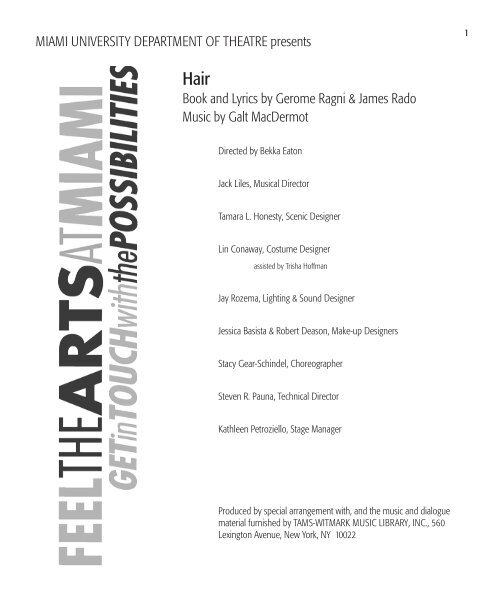
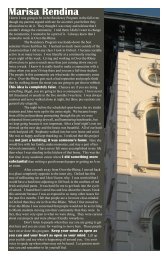
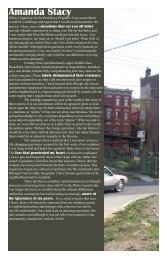

![Internship Guidelines [PDF] - Miami University School of Fine Arts](https://img.yumpu.com/36626387/1/190x245/internship-guidelines-pdf-miami-university-school-of-fine-arts.jpg?quality=85)



